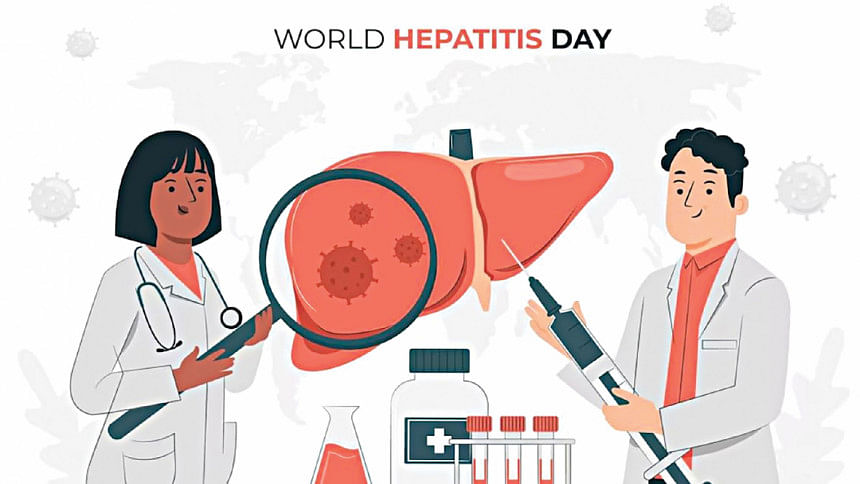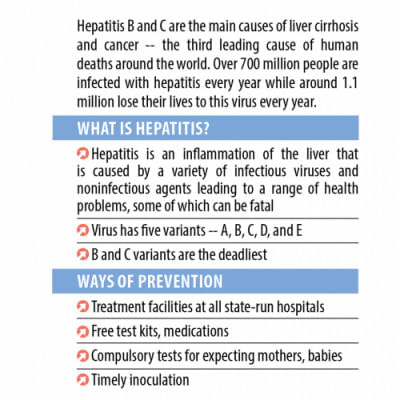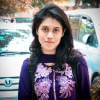World Hepatitis day: Hepatitis a silent killer


"I did not know I had hepatitis C, not even during my pregnancy," said Muslima Kader Mili, a 35-year-old mother of two.
The Brahmanbaria resident found out she had the virus in 2013 when doctors did her blood work, as she was one of the potential donors for her daughter, who needed to undergo an operation at Shaheed Suhrawardy Medical College Hospital in the capital.
"That day, the doctors informed me of the virus and how the blood transfusion would also infect my child. I had never heard of any such virus before," she added.
Mili had to take seven units of blood during her first C-section at Dhaka Medical College Hospital in 2002 as she developed eclampsia.
"I must have been infected during that time. However, none of my children have the virus," she said.
According to doctors, hepatitis C can be transferred from mother to child but it is not contagious.
Nevertheless, many in Mili's family and neighbourhood were unaware of the virus. But suggested alternative treatments by village quacks and homoeopathy, as the medicinal treatment for hepatitis C is expensive.
Marzia Begum, another 25-year-old mother of two, shared a similar experience.
"I did not know that I had hepatitis B when my first child, now 11 years old, was born. However, I got to know of my condition when my second child, a girl, was born in 2019," she said.
The virus was passed on to her daughter Lamia, the second born.
Mili, Marzia, and Lamia are currently receiving free treatment at the National Liver Foundation Bangladesh (NLFB) under their Zakat Fund programme.
According to WHO, hepatitis is an inflammation of the liver that is caused by a variety of infectious viruses and noninfectious agents leading to a range of health problems, some of which can be fatal.
The virus has five variants -- A, B, C, D, and E.
The A and E variants can be transmitted through food and drinking water but usually resolve within 4-8 weeks through the body's built-in immune system, informed Dr Mohammad Ali, liver surgeon and founder of NLFB.
E variant can cause complications during pregnancy for the mother and her child. Meanwhile, the D and B variants may lead to chronic inflammation. However, the B and C variants are the deadliest, he mentioned.
Over 700 million people are infected with hepatitis every year, while around 1.1 million lose their lives to this virus every year, said the doctor, referring to a WHO study.
"Hepatitis B and C are the main causes of liver cirrhosis and cancer -- the third leading cause of human deaths around the world. These two variants are silent killers, as only one percent of B virus carriers and 1.5 percent of C variant carriers are under treatment worldwide," he said.
The B variant is mostly genetic, as it is passed on from the mother to the child. The figures are 40-90 percent for B and 5 percent for C variant, he added.
To prevent hepatitis, expecting mothers should be tested before delivery, and babies should be screened immediately after birth. Infected newborns should be given the first dose of vaccine within 24 hours of birth, followed by two other doses -- one when the baby is a couple of months old and another at six months.
NLFB is serving poor patients for free, but not all from marginalised households, especially those in rural areas, have access to them. The capacity and resources are also limited, stressed Dr Ali.
Hepatitis treatment and medication are expensive, said Dr Faroq Ahmed, associate professor and head of Dhaka Medical College Hospital's hepatology department.
Patients have to spend around Tk 5000-7000 on tests at state-run hospitals. However, DMCH does not have a DNA test facility, which compels the infected to go to private hospitals where the test fees are Tk 10,000-12,000, he informed.
The annual treatment costs add up to some Tk 30,000-45,000. Some need three to four years to fully recover, while others have to be on medication throughout their lives," he mentioned.
"To prevent hepatitis, treatment facilities should be introduced in all state-run hospitals. Test kits and medications should be available for free or at a subsidised price, and should be accessible to all," he added.

 For all latest news, follow The Daily Star's Google News channel.
For all latest news, follow The Daily Star's Google News channel. 



Comments